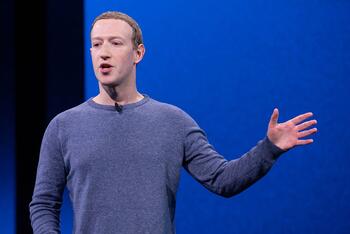
Many have understandably applauded Facebook’s decision to ban former President Donald Trump from the site for the next two years, but the ability of a company to decide who should be in the public square, which the social network has effectively become, raises troubling questions about the future of our tattered democracy.
The decision was announced by Nick Clegg, the former deputy prime minister of the United Kingdom who’s now the vice president of global affairs at the social network, but there’s no question that the final call here belonged to Facebook’s co-founder, chairman, CEO, and controlling stockholder.
Not long ago, Mark Zuckerberg was a kind of folk hero to many Americans, a nerd who made billions with an idea developed at a Harvard dorm. He was a firm believer in free speech as recently as 2019, even to the point of offending the progressive cognoscenti. All that has changed, along with the political currents.
His free speech views faded when they became a threat, rather than a boon, to his bottom line. Now, rather than being seen the way he wants to be, as an open-minded entrepreneur and even a potential presidential candidate, Zuckerberg finally stands exposed as a leading member of the new techno-aristocracy manipulating the world and shaping our society to fit their own world view, while getting ever richer in the process.
This ascendency offers little for most Americans, even as Americans have provided so much to Zuckerberg and his ilk as tech has become ever more concentrated and monopolistic, putting a lie to the heroic myth of “a guy and a garage.” Since 2019, Facebook, Apple, Amazon, Microsoft, and Google have added more than two and a half trillion dollars to their valuation, including record-breaking profits in 2020 as the pandemic shut down much of the in-person economy, while workers and consumers have faced stagnant incomes and purchasing power.
This is, as the left of center American Prospect put it, “predatory capitalism.”
This accrual of power relies on having influence in Washington. Quasi-monopolies like Facebook could never have grown into such behemoths if not for the willingness of regulators, in both parties, to let them buy potential competitors like Instagram, Oculus, and WhatsApp. Taking a proactive approach, Zuckerberg put several fingers on the scales to assure the defeat of the less controllable Trump by financing Election Day operations in many critical states through an obscure Chicago based front group, the Center for Tech and Civic Life, which used its Facebook windfall to fund election offices, and staffers, around the country.
Facebook itself, along with Twitter, also de-platformed the New York Post, America’s oldest newspaper, to keep information about Hunter Biden’s laptop from circulating. And both sites booted Trump himself, a stance that horrified those like German Chancellor Angela Merkel and Russian dissident Alexei Navalny who have lived under autocratic regimes.
Read the rest of this piece at Daily Beast.
Joel Kotkin is the author of The Coming of Neo-Feudalism: A Warning to the Global Middle Class. He is the Presidential Fellow in Urban Futures at Chapman University and Executive Director for Urban Reform Institute. Learn more at joelkotkin.com and follow him on Twitter @joelkotkin.
Homepage photo: Anthony Qunitano, via Flickr under CC 2.0 License.












